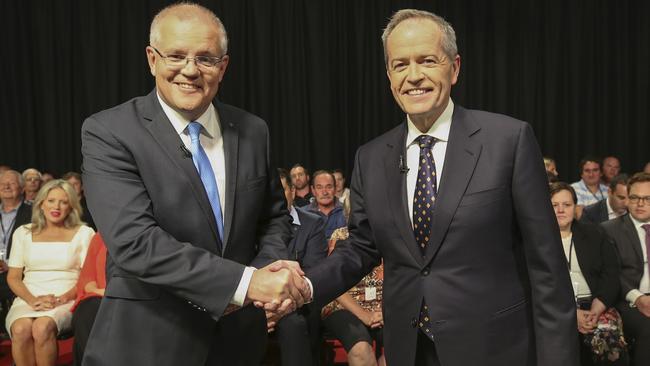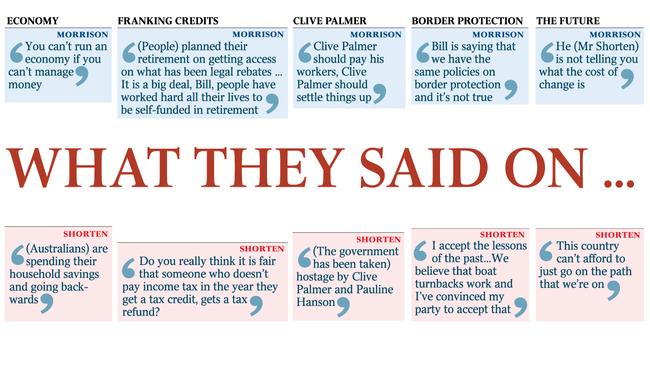Priceless: Shorten’s climate change cost
Bill Shorten concedes for the first time it’s impossible to put a single price on the cost of his emissions-reduction targets.

Bill Shorten has conceded for the first time that it is not possible to put a single price on the cost of his emissions-reduction targets, while claiming he has accepted the lessons of the former Labor government’s border protection failures.
In the first leaders debate of the campaign televised nationally last night, the Opposition Leader was also forced to defend his $378 billion tax grab as Scott Morrison went on the attack over Labor’s economic record.
However, Mr Shorten won over the audience by arguing the case for action on climate change and greater equity on wages, and launched an attack on the Coalition’s preference deal with Clive Palmer.
The Prime Minister made the case for the return of a Coalition government on the strength of its economic record, saying that over the past five years the government had delivered a strong economy and driven down unemployment.
His pitch to swing voters focused on the creation of 100,000 jobs for young Australians and bringing the budget back into surplus for the first time in 12 years.
Seeking to combat Labor’s campaign on education and health, Mr Morrison said the Coalition had provided record funding in public hospitals.
The 48 voters in the Seven West Media studio in Perth, who all identified as undecided, were instructed not to approach the leaders before the broadcast.
Chloe Shorten, Finance Minister Mathias Cormann and Mr Morrison’s key lieutenant, Ben Morton, were in the audience to support the leaders.
The verdict of the audience was a clear victory for Mr Shorten, who improved through the debate after being forced to defend a spirited attack by Mr Morrison over the cost of a Shorten government.

Mr Morrison said it was imperative for Mr Shorten to explain his policy agenda better. “That’s why today’s debate is important,” he said. “Today is the day we should know. What is the total tax bill that Bill is going to put on people? What is the cost of his emissions-reductions policies?”
Mr Shorten admitted it was not possible to give a number for the impact of the policy when asked to rule out whether there would be a negative impact on the economy or job losses from his climate change policy.
“This issue about ‘give us one number’ … I don’t think that’s possible to do,” he said.
But he argued that if Australia did not take real action on climate change it would be a “disaster” for the economy.
The Opposition Leader then accused Mr Morrison of having his head buried in the “motoring pages” after the Prime Minister won a heated debate about the cost of electric vehicles.
Mr Shorten argued that the economy was no longer working for Australians and that there was a “mood for change in Australia”.
Mr Morrison said the cost of changing governments was too great.
Of the 48 undecided voters in the audience, 25 thought the Opposition Leader won the debate, while 12 thought the Prime Minister did. Eleven voters were undecided.
The debate became most heated over Labor’s policy to abolish franking credit refunds, which Mr Shorten said was a “gift” that the nation could no longer afford. The government has labelled Labor’s move a “tax on retirees”.
In his closing remarks, Mr Morrison said Australians faced an important choice on the direction of the economy over the next decade. He said the choice for voters was between a government that had proven its economic credentials, which were vital to deliver essential services such as hospitals and schools.
“There is a clear choice: higher taxes or lower taxes; strong management of finances or weaker management; a strong economy or a weak economy,” the Prime Minister said.
Mr Morrison warned voters that Labor had not been clear about the cost of change. “He (Mr Shorten) is not telling you what the cost of change is,” he said.
The Prime Minister said that the fundamental details about the impact of Labor’s emissions-reduction policy and its plan to scrap franking credit refunds had not been properly outlined.
“Voting has started. People deserve to know what the cost of change is,” he said. “Now is not the time to turn back.”
Mr Shorten offered a contrary message, declaring: “This country can’t afford to just go on the path that we’re on.”
He argued that Australia was slipping behind comparable countries on a range of benchmarks, including waiting lists for surgery, educational outcomes, wages growth and broadband speeds.
Mr Shorten said a failure to change the government would lead to poorer environmental outcomes and inaction on the closure of unsustainable tax loopholes.
The debate was played out against the backdrop of a tightening election contest, with a Newspoll published in The Australian yesterday showing the two-party vote narrowing to 51-49 in Labor’s favour. With early voting now open and the poll less than three weeks away, both sides have sought to seize the agenda.
Mr Shorten has announced more than $16bn in spending promises since Sunday, including a highly controversial move that would have a Labor government intervene in the labour market, using its tax take to fund pay rises for childcare workers.
Having spent the first two weeks focusing on tax and the economy, Mr Morrison has in recent days sought to shift the contest to border protection and population pressures while attacking Labor’s “spending spree”.
A second debate is scheduled for Friday. It will take the form of a Sky News People’s Forum in Brisbane, where members of the public are asked to pose questions to both leaders from the floor.
That debate will be held in conjunction with NewsCorp Australia’s The Courier-Mail.
An argument is ongoing over a third debate, with Mr Morrison seeking a formal debate on ABC television, which Mr Shorten has refused to commit to.
Additional reporting: Joe Kelly, Ben Packham, Greg Brown




To join the conversation, please log in. Don't have an account? Register
Join the conversation, you are commenting as Logout